Rainbow CGI Studio (2014), Paramount Home Entertainment (February 17th, 2015), 1 DVD, 94 minutes, No Supplements, 2.39:1 Ratio, Dolby Digital 5.1, Rated PG, Retail $29.99
Storyboard:
Lazy Timo is expelled from the Gladiator’s Academy in Rome when his friends force him to take a magic potion which will make him stronger. Now without anything to drive him, his only motive to fulfill his foster father Chirone’s dream of him becoming a famous warrior is his childhood sweetheart, Lucilla, who is set to be married to Cassio, the Emperor’s evil nephew. With the help of his tough new trainer, Diana (yes, that Diana), can Timo beat Cassio in a fight to the death in the arena and win back the heart of his beloved? Or will Cassio and his band of baby gladiators (yes, baby gladiators!) stop him from being able to even compete?
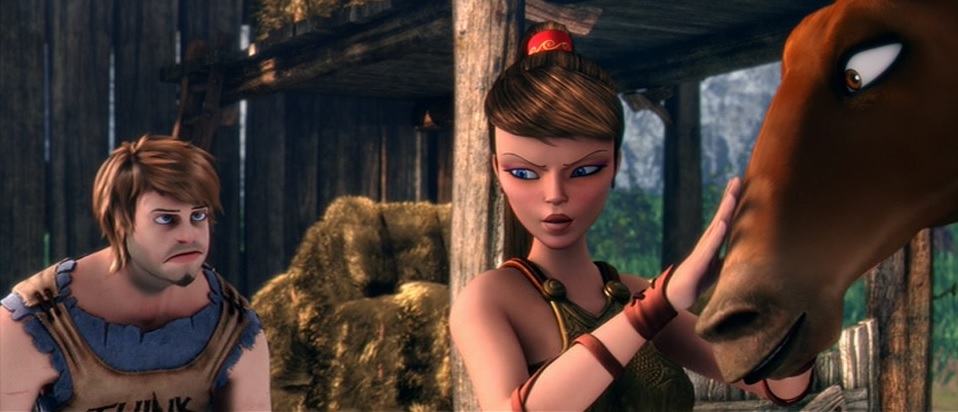
The Sweatbox Review:
Let’s start with the question that is most likely on your mind right now as you read this: Where exactly did Gladiators of Rome even come from?
Background information on the film seems fairly hard to come by on the internet, but from what I gather, Gladiators of Rome is a 2012 animated movie from Italy (with the English translation of its original title supposedly being Not Born to Be Gladiators), coming to us from something called Rainbow CGI Studios. From my understanding, it didn’t do very well in its home country–Box Office Mojo claims that it only made a fraction of its $40 million production budget back–, so it’s a bit surprising that the film found an American distributor, especially since even the good foreign language animated films often have trouble finding their way to the states. But Paramount Pictures apparently showed enough interest to give the film an extremely limited theatrical run last year (where it reportedly made only $8,000 or so), and now the movie has found itself on American store shelves, albeit with very little fanfare behind it.
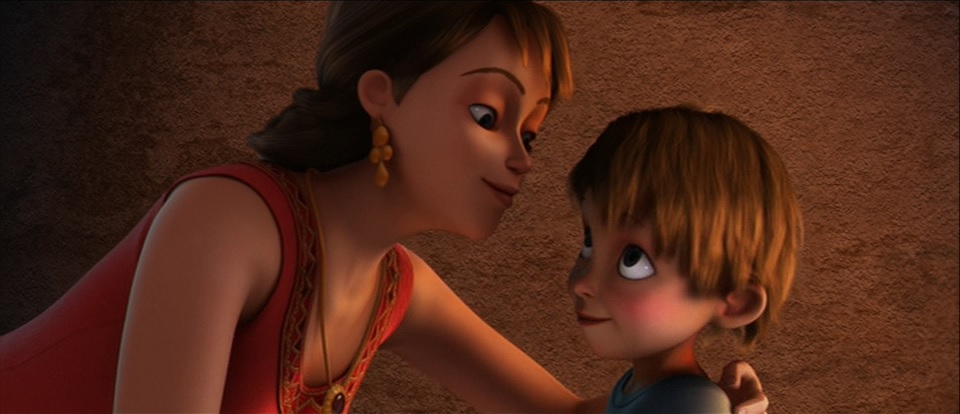
Which brings us to the question of what exactly is Gladiators of Rome? Essentially, it seems to want to be “Gladiator for kids,” and that statement alone should be enough to tell you just how confused this movie is about itself. Gladiatorial combat in Ancient Rome, of course, consisted of men (mostly slaves) being forced to fight each other to the death all in the name of public entertainment. Sounds like a good history subject to center your wacky family comedy around, right? I understand that The Hunger Games–which more or less has the exact same plot as Gladiator–is all the rage with children these days, but those books/movies at least know to treat themselves seriously (arguably too seriously in the case of Mockingjay, but that’s a topic for another review). Here, we have a lead character who is becoming a gladiator not because he has any interest in doing so, but because it’s what his foster father wants him to do. And the reason for him showing reluctance in the field has nothing to do with him, you know, not wanting to be killed in the arena, but with him being “too lazy” and “having no motivation.”
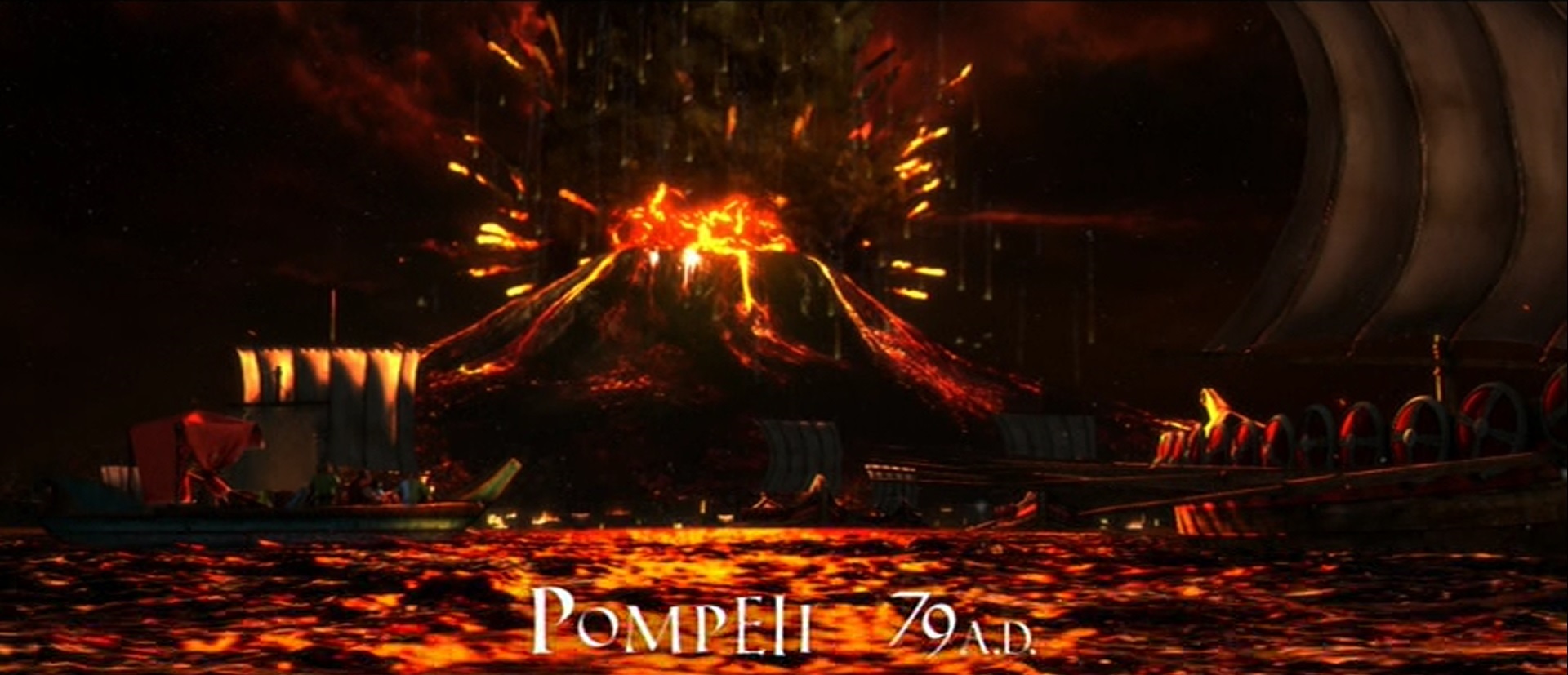
There’s also the memory of a dead parent that’s possibly holding him back, although the film handles this aspect so sloppily that it’s hard to tell if it’s meant to be part of his character development or just something the filmmakers threw in because Disney movies do the same thing. By the two minute mark–and I’m not exaggerating at all when I say this–, Timo’s mother has already been introduced and killed off, so abruptly and unceremoniously that I actually laughed out loud despite knowing I obviously wasn’t supposed to. With his mother crushed by a falling boulder during the volcanic destruction of Pompeii (even though the editing makes it seem as though he were in her arms when it happened, meaning that he should be dead, too), Timo finds himself orphaned, but is then immediately snatched up and adopted by Chirone and taken off to Rome. All of this happens–again, not exaggerating when I say this–by the three minute mark, including the lengthy animated logos that open up the film.
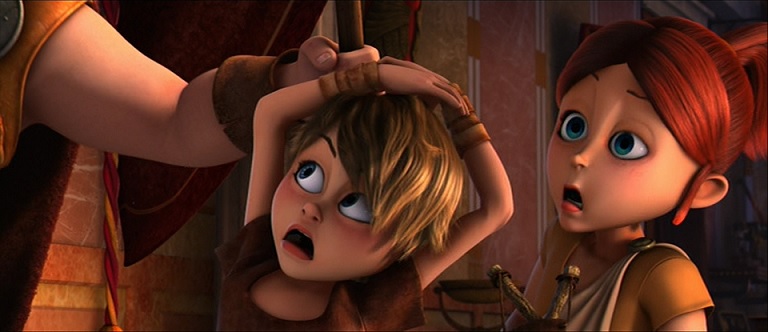
Unfortunately, the film’s pacing doesn’t improve much from there. Indeed, even during its “quiet” moments, Gladiators of Rome is a movie that doesn’t know how to hold still. Characters shout when they have no reason to do so, wave their arms around wildly when they’re supposed to be having intimate conversations, and, most distractingly, are always taking in part in random of acts of slapstick that almost never have any form of actual comedic timing behind them. Often a cute animal will show up for no reason, do something “funny,” and then leave just as quickly as they appeared. Much like 1999’s animated remake of The King & I, this is a movie that is so afraid of its audience becoming bored with it that it must always be throwing something at the screen to occupy them, much in the same way that parents will desperately wave car keys in front of babies in order keep them from crying.
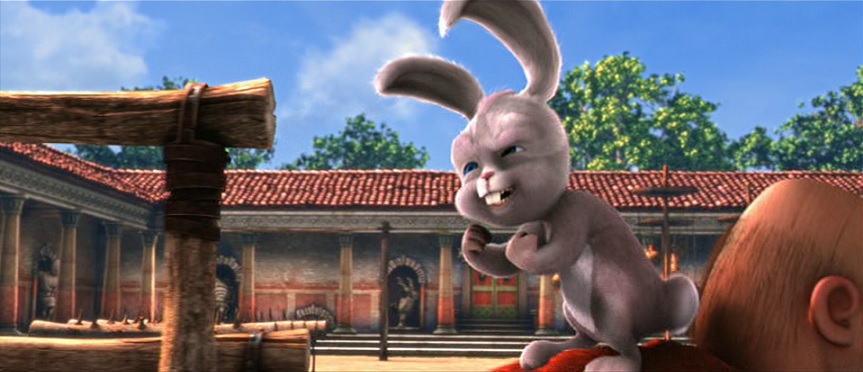
Part of this may be due to the English dub. Forget the excellent English language casts of Studio Ghibli films that sometimes rival the original recordings (Chloë Grace Moretz is so exceptional as the title character in The Tale of The Princess Kaguya that it’s hard for me to picture anyone else playing her, to provide just one example). With a few notable exceptions, the majority of the actors here seem to just be yelling their dialogue, often “in sync” with the characters’ mouth movements so poorly that it almost becomes unnerving. For all I know, the original Italian version of Gladiators of Rome (which, curiously enough, isn’t included on this DVD) is much quieter and more laid back, but given just how frantic everything always is on screen, I doubt that.
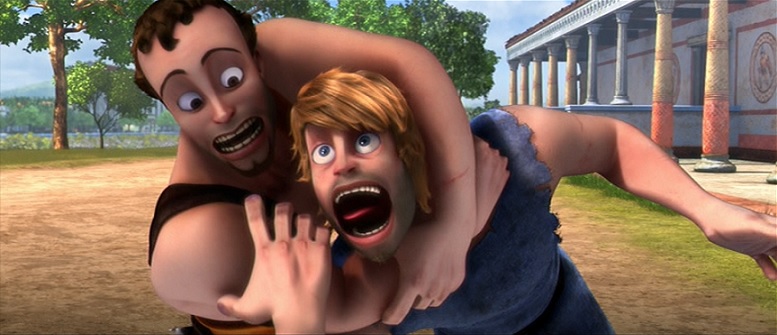
How frantic does Gladiators of Rome get? Frantic enough to somehow fit baby gladiators (again, baby gladiators!) and a batty old witch named Circe into the storyline, with the latter being a character that the film unfortunately keeps deciding to return to. Introduced standing in front of a mirror as she shaves her face (think Yzma from The Emperor’s New Groove if she wasn’t even remotely funny), Circe speaks with an “accent” that is so thick that it is virtually impossible to understand what she is meant to be saying. And on the rare occasion when she is comprehensible, she’s just making obscure anachronistic references to penicillin or “inventing the blue pill.” The movie has a lot of humor of this sort, but never finds a way to be consistent with it, with a few of the jokes managing to land on their feet (“He’s on something! Give him a potions test!”), but too many of them causing confusion more than anything.
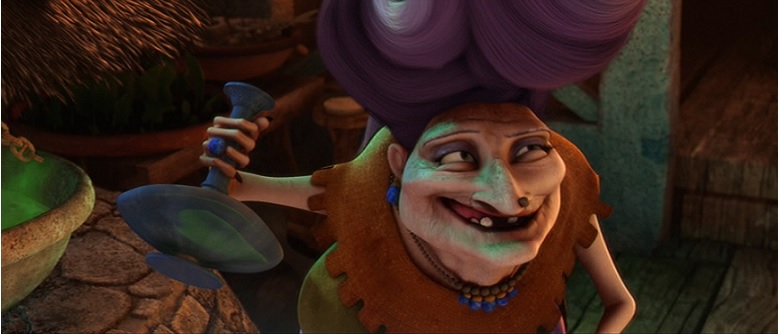
That confusion, frustratingly, is evident throughout the plot, which really doesn’t make much sense. Why on earth should Timo want to be a gladiator? Why would anyone want that profession? Since the movie, not surprisingly, never brings slaves into the equation, no one in the arena is apparently there against their will, so why are they choosing to fight each other to the death? Why would Chirone want to force this occupation on his foster son when it could potentially mean watching him get killed? And why does Lucilla, who seems to be peaceful person overall, want for Timo to slaughter people just for the sake of entertaining the masses? None of these questions are ever addressed by the film, which wouldn’t be a problem for me at all if it were an episode of Family Guy in which Peter Griffin became a gladiator, but does raise some concerns when the movie’s target audience is children (a horse who farts no less than three times is proof of that).

Also concerning, honestly, is Lucilla herself. I’m not saying that I expect for all women in animated movies to be as strong as female heroes like Elsa in Frozen (although it would be nice if they were), but Lucilla is so passive to everything that goes on around her that she doesn’t function as a character so much as a prop. She’s in an unpleasant situation where the outcome of a gladiatorial combat match will decide who she has to marry, but she doesn’t do anything to combat that fate, instead just complaining to Timo that he “doesn’t ever try to do anything” and telling him that “she didn’t know that he became pregnant” when she first sees the weight he’s gained over the years (because that’s a saying kids need to start quoting, obviously). Even worse, she becomes victim to the whole “misunderstanding” cliche that we’ve seen so many times when she’s tricked into thinking that Timo’s relationship with Diana has become romantic. And to top it all off, she’s regulated to “damsel in distress” during the film’s climax, which serves no purpose to anything since the stakes–involving Timo, supposedly, “fighting to the death” in the arena–are already high enough as they are.
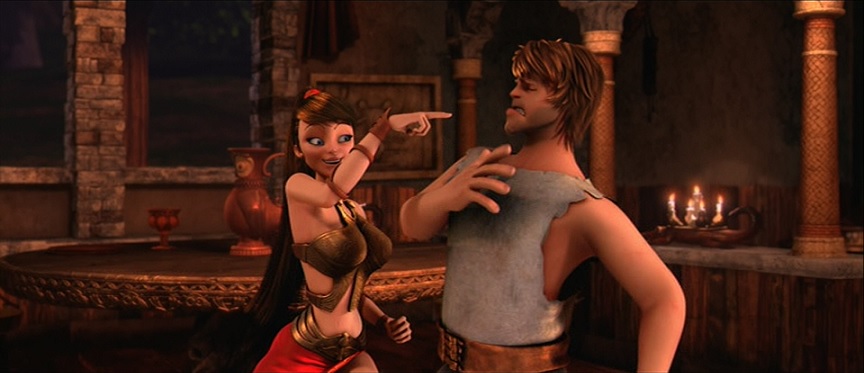
On the other side of that, Timo’s relationship with Diana does fare a little better. Although I wished it would amount to something more than her just abusing him over and over again (this may be the first children’s movie I’ve ever seen where a woman pins a man to the ground by placing her foot directly on his crotch), her introduction does give Gladiators of Rome something resembling narrative footing, and I liked that they were able to form an “acquaintanceship” with each other without ever becoming a couple. The scene where Timo finds out about her through a series of incredibly specific flyers is actually pretty amusing, and there are a number of moments following this where I was surprised by the fact that I genuinely laughed. Granted, that’s only faint praise at best, but after the film’s dismal opening twenty minutes or so, anything that feels like entertainment comes across as a relief.
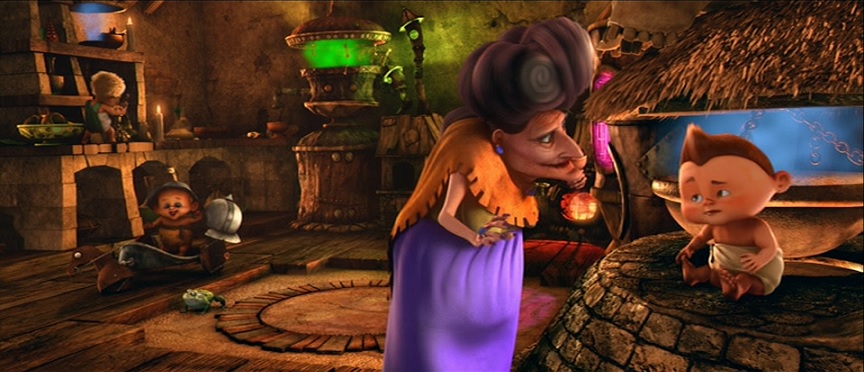
Of course, that only ends up going but so far, and for every good joke that Gladiators of Rome does manage to pull off, there are many more that sadly end up being obnoxious. Those aforementioned baby gladiators (baby gladiators!) seem to be here to give the movie an “edge,” but their purpose in the story is never made clear (why exactly are they serving Cassio anyway?), and their scenes–of which there are really too many–aren’t nearly as clever as the filmmakers apparently think they are. Similarly, there are several pop culture references that come out of nowhere, and even the ones that are pretty funny (“I hate these things…and they put them in every movie!” Timo laments as he has to cross a rickety bridge over a canyon at one point) don’t technically “work” since they are so inconsistent in terms of whatever tone the movie is attempting to go for. Is Gladiators of Rome trying to be a straightforward adventure like Kung Fu Panda? Or is it wanting to be a “modern” comedy in the vein of Disney’s Hercules? It never really makes up its mind, resulting in us getting references to things like 2 Fast 2 Furious of all things during a chariot race sequence, which is just about as forced and awkward as it sounds.
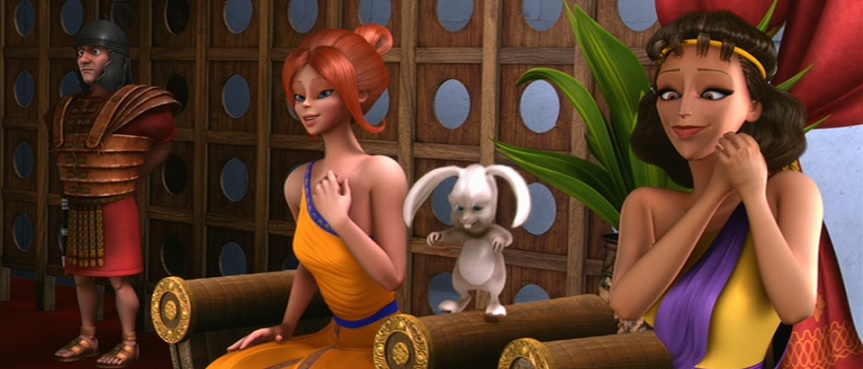
Nothing in the film is more awkward, however, than its climatic battle, which finds numerous stereotypes from across the world comically disposing of themselves so that Timo doesn’t have to do any actual killing in the arena himself. In fact, the movie pretty much abandons the gladiator concept its been building up to after a certain point, with Cassio taking a magic potion that transforms him into a giant minotaur and Timo having to stop him from kidnapping Lucilla. But even with that brought into play, perhaps the most perplexing thing about Gladiators of Rome is how generic it feels despite all of its bizarre material. It’s almost disappointing, in a sense, that the movie’s not worse than it is, because then at least it might be fascinating on a Food Fight kind of level, instead of being almost instantly forgettable once the credits start rolling. Despite being a movie that is constantly ordering its lead character to “try harder,” Gladiators of Rome is a movie that doesn’t seem to be trying at all, and the fact that it never strives to be anything more than a passable rental for kids may be its greatest sin. To answer Maximus’ famous question to his bloodthirsty crowd of spectators in Gladiator, no, this was not what I wanted. And, sadly, I was not very entertained.
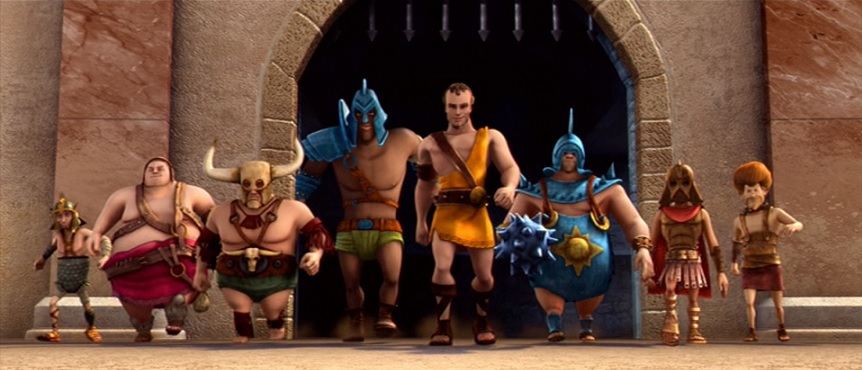
Is This Thing Loaded?
Gladiators of Rome has no special features. None. Not even any trailers are included, and the disc’s menu is just the DVD cover without so much as any background music. Pathetic to say the least.
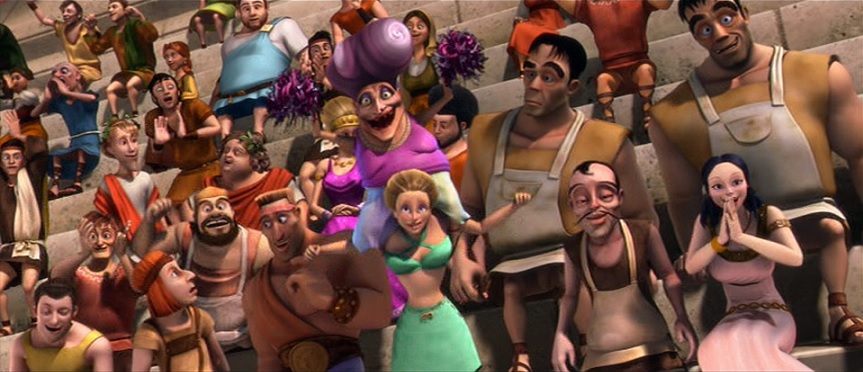
Case Study:
Gladiators of Rome comes in a black plastic case where all of the characters look hilariously off-model. More notably, though, is that it’s one of those awful “environmentally friendly” cases where some of the plastic is missing in order to form a giant recycling symbol. Speaking as someone who tries to be greener on a day-to-day basis (I feel guilty even flushing the toilet!), I always hate it when DVD cases are produced this way, since the real motive behind it seems to be saving the studio money more than anything, and the lack of “protection” makes the disc extremely vulnerable to damage. No inserts of any sort are included.

Ink And Paint:
Gladiators of Rome is a brand new movie, so it goes without saying that there’s not any grain or dirt to be found here, even though the disc’s presentation is serviceable at best. Colors sometimes blend into each other, particularly when shades of red are used, and texture often looks off, especially during night scenes. Still, for the most part, whatever problems Gladiators of Rome has visually are probably the movie’s fault, rather than the disc’s.
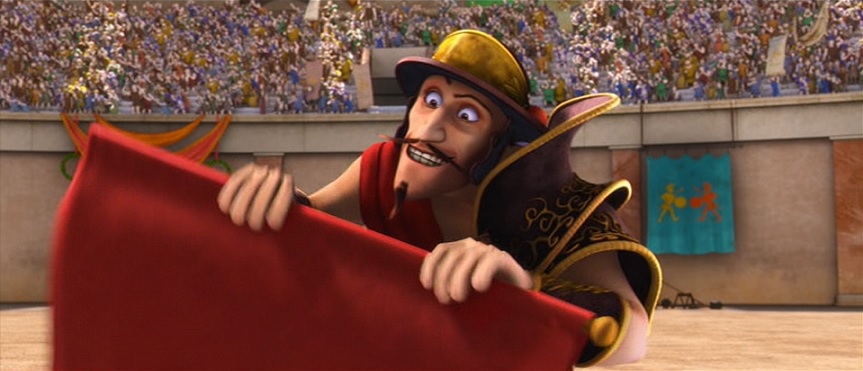
Scratch Track:
Here’s where Gladiators of Rome gets baffling. Despite being presented in Dolby Digital 5.1, the audio here is incredibly uneven…and I don’t mean that lightly. Characters will often shout their lines, yet their dialogue will be hard to understand at the same time, overpowered by other aspects of the film’s soundtrack. There were at least a dozen times where I had to rewind the movie, turn on subtitles, and move on from there just so I could know what was being said. Never before have I heard words shouted so loudly while still being unable to make them out.
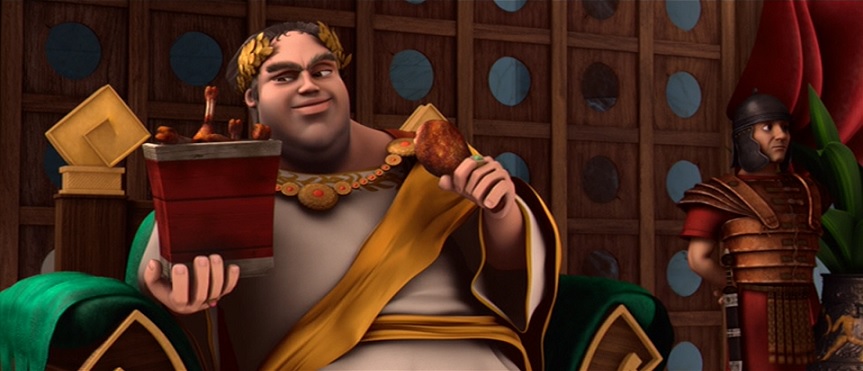
At first, I thought this just might be my TV, where I found myself constantly having to adjust the volume. But when I played some clips from the movie on my laptop, they were the same way. I will come up front and say that I do not possess a surround sound system in my house, but have nevertheless still noticed the sound being “better” when I watch a movie with Dolby Digital 5.1 on my television in the past. Even without that being taken into account, though, the audio on Gladiators of Rome is almost embarrassingly bad, and while I have a feeling it’s not any better when actually heard in surround sound, I have added one point to my low score of it just in case I’m wrong. A French language track is also included.
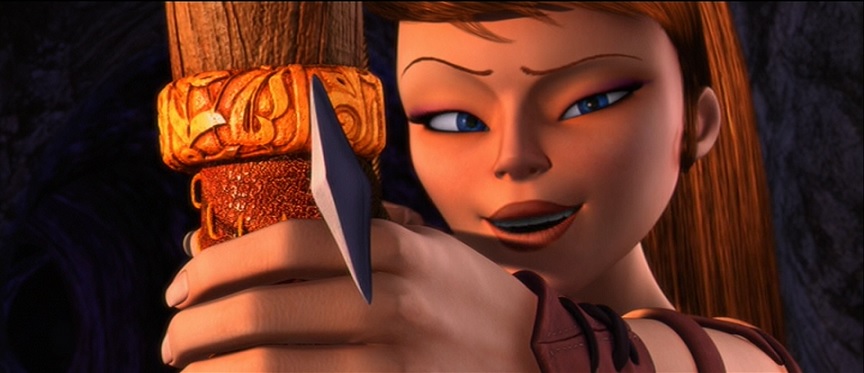
Final Cut:
There are no shortage of good animated movies right now. In fact, with Frozen, The Lego Movie, and How to Train Your Dragon 2 all opening within a year of each other, the argument could be made that we are living in a golden age of animation. Having said that, Gladiators of Rome serves as a reminder that there’s still plenty of mediocre animation out there, and while the movie falls short of being “terrible,” it’s hard to find many grounds to recommend a purchase on. With no special features, it’s pretty steeply priced, and even those who find themselves liking the film will be frustrated by the average picture quality and downright awful audio. Gladiators of Rome is a movie that pulls off the seemingly impossible task of being both insanely weird and bland at the same time, and the film’s casual yet tame use of violence may make it a tough call for some parents of small children. Still, there are some laughs here–most of which I’ve made an effort not to spoil–, and the movie does manage to be watchable, even if just barely so. Even so, a rental is recommended for anyone before they think of giving this one a blind buy. Also, seriously, baby gladiators?!?!
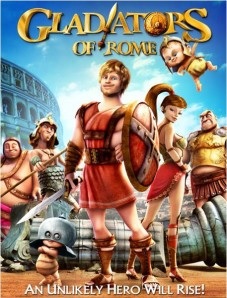 | ||
 |







